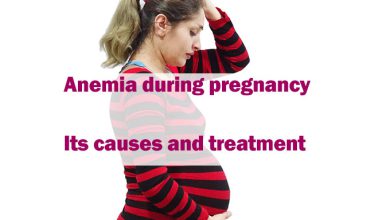Indigestion and heartburn in pregnancy

Despite its name, heartburn during pregnancy has nothing to do with the heart. However, some of its symptoms are similar to those of a stroke or heart attack. Heartburn during pregnancy is actually an irritation of the esophagus caused by stomach acid and is a common complaint during pregnancy, especially in the third trimester when the growing uterus puts pressure on the age.
A muscular valve called the lower esophageal sphincter or LES keeps stomach acid in the stomach with the help of gravity. The LES is located at the junction of the esophagus and the stomach, below the ribcage, and slightly to the left of the center.
Normally, this valve opens and then closes again to allow food to enter the stomach or belch. But if the LES opens too soon or doesn’t close tightly enough, stomach acid can reflux or leak back into the esophagus, causing heartburn.
Heartburn, which occurs occasionally, is not dangerous. But its chronic condition can indicate serious problems such as inflammation of the stomach or Gastroesophageal reflux disease, which is also called GERD. Heartburn is a daily occurrence in 10% of normal people and 50% of pregnant women. This disease is a problem in 30% of people and it happens from time to time.
Related posts: Phosphorus in Pregnancy Diet
Symptoms of heartburn in pregnancy
The symptoms of heartburn are different in different people. But the common symptoms of heartburn in pregnant women are:
What are the causes of heartburn during pregnancy and who is more prone to this problem?
Medical professionals aren’t exactly sure what causes heartburn during pregnancy,
but they suspect it’s a three-pronged problem caused by the following:
Hormonal changes
Progesterone hormone, also known as the pregnancy hormone, is the main culprit of heartburn during pregnancy. This hormone acts as a muscle relaxant and can relax the tight muscle of the lower esophageal valve that blocks the entrance to your stomach.
When you eat or drink, this muscle normally opens to push its contents into the stomach; Therefore, with the increase in the level of progesterone that occurs during pregnancy, stomach acid can go to the esophagus and even the pharynx.
A developing fetus
When your uterus expands every day with the growing fetus, it has to compete with other organs to find enough space in the abdomen.
As a result, the growing uterus puts pressure on the stomach and the lower esophagus-to-stomach valve, causing acid reflux to occur, especially if the stomach is full. Therefore, according to most researchers, heartburn worsens as pregnancy progresses.
Slow digestion process
Thanks to the increase in progesterone during pregnancy and the relaxation of the stomach muscles, the digestion process slows down and the contents of the stomach remain in it longer than normal. As the digestion process slows down and the stomach remains full, the possibility of heartburn increases.
Other causes of heartburn during pregnancy include the following:
- Taking some anti-nausea medications during pregnancy can cause or worsen heartburn.
- Having a history of gastric acid reflux to the esophagus before pregnancy or as a result of a previous pregnancy
- A severe pregnancy complication called HELLP syndrome can cause symptoms such as heartburn, heartache, a burning sensation in the chest, and a feeling of pressure or pain in the upper part of the stomach.
- Gluttony
- Constantly eating spicy, high-fat foods containing processed meats
- Excessive consumption of citrus fruits, tomatoes, chocolate, caffeine, and soda or other carbonated beverages.
- Smoking
- Obesity
- Alcohol consumption during pregnancy
Types of heartburn during pregnancy
Types of heartburn during pregnancy are usually classified based on the cause and severity. In some women, this problem is mild, and in others, it is so severe that it causes loss of appetite or sleep problems.

Heartburn usually starts in the first trimester for some women, improves in the second trimester, and worsens in the third trimester, while others struggle with it throughout pregnancy. It is interesting to know that sometimes heartburn is one of the early symptoms of pregnancy; So don’t ignore heartburn in early pregnancy.
What are the complications of heartburn during pregnancy?
Heartburn during pregnancy can cause discomfort and sleep disturbance, but its side effects are usually not dangerous. Usually, your doctor will check your condition more carefully and you should be monitored if you see the following complications:
- Persistent sore throat
- Difficulty swallowing or pain when swallowing
- Constant pain in the chest
- Throat congestion
- Hoarseness and voice change
- Shortness of breath and persistent cough
- Sudden weight loss
- Reduction in the number of red blood cells and the onset of anemia
Is it possible to prevent heartburn during pregnancy?
Fortunately, it is possible to prevent and deal with heartburn during pregnancy by using the following methods:
- Pay attention to what you eat. Not surprisingly, acidic and spicy foods produce more stomach acid than mild foods; Therefore, avoid citrus fruits, tomatoes, onions, garlic, caffeine, chocolate, and other acidic foods. Also, limit the use of fried or fatty foods that slow down the digestion process.
- Increase the number of your meals. It is better to eat six times a day instead of three times a day by reducing the size of each meal. This helps your stomach to digest food faster and empty it faster.
- Sit up straight when eating. This work has a great effect in controlling acid reflux from the stomach to the esophagus.
- Try not to eat three hours before going to bed. This helps a lot in preventing the symptoms of heartburn before sleep.
- Do not smoke. There are many reasons why you should not smoke during pregnancy. The chemicals in cigarettes cause the valve between the stomach and the esophagus to relax, thereby stimulating the reflux of stomach acid into the esophagus.
- Raise your head when sleeping. Be sure to place a pillow under your shoulders, so that under your head is 10 to 15 cm higher than the floor.
- Wear loose clothing. Any type of clothing that can put pressure on your stomach is sure to trigger acid reflux into the esophagus.
- Avoid drinking liquids between meals and limit your consumption of tea and coffee due to their caffeine content.
- Try acupuncture. According to a 2015 study, women who had gastric reflux before pregnancy and underwent acupuncture improved their condition during pregnancy.
- Do not drink alcohol. In addition to the fact that alcohol consumption can cause a variety of complications for a growing baby, from low birth weight to learning disabilities, alcohol can relax the valve between the stomach and esophagus, causing stomach acid to back up into the esophagus.
- Ask your doctor about safe antacids for pregnancy. If you have a history of acid reflux, talk to your doctor as soon as you begin pregnancy.
Types of ways to treat heartburn during pregnancy that you should know
If the strategies mentioned in preventing and dealing with heartburn are not effective, the doctor prescribes medicine for treatment. Today, many medicines can help relieve heartburn during pregnancy. Antacids can reduce the feeling of heartburn by neutralizing stomach acid. Antacids containing calcium carbonate are one of the most common.
When heartburn is severe, the doctor may prescribe antacids such as sucralfate, H2 receptor agonists, or proton pump inhibitors such as ranitidine and omeprazole. A 2015 study also reported the beneficial effects of sucralfate consumption at the same time as lifestyle changes and controlling gastric acid reflux during pregnancy.
During pregnancy, you should think about the safety of everything you put into your body. Some types of tablets for heartburn in pregnancy (antacid drugs) are not suitable for you, such as the following:
- Antacids containing sodium bicarbonate, which can increase the swelling of the gastroesophageal valve.
- Antacids containing aspirin can be toxic to your baby. Basically, the use of aspirin during pregnancy is associated with the risk of miscarriage, heart defects, and cerebral hemorrhage in premature babies.
- Antacids containing magnesium trisilicate, which have not yet been proven to be safe to use during pregnancy.
Talk to your doctor if you’re taking medication for another condition, such as antidepressants, as some medications can make reflux worse. Never stop taking prescribed medication to treat heartburn unless your doctor tells you to. Antacids can prevent the body from absorbing iron.
What foods cause heartburn?
What is the main cause of heartburn in pregnancy?
What are the effects of heartburn during pregnancy?
How can I relieve my heartburn while pregnant?
In conclusion, heartburn is a common symptom experienced by many pregnant women. While it can be uncomfortable and disruptive, there are several effective strategies that can help alleviate the discomfort associated with heartburn during pregnancy.
Making dietary changes, such as avoiding spicy and acidic foods, and eating smaller, more frequent meals can help reduce heartburn symptoms. Additionally, lifestyle modifications like avoiding lying down immediately after eating and propping up the head of the bed can also be helpful.
If symptoms persist despite these interventions, there are several safe and effective over-the-counter and prescription medications that can provide relief. Ultimately, by working with their healthcare provider and implementing a variety of strategies, pregnant women can effectively manage heartburn symptoms and improve their overall comfort and well-being.
